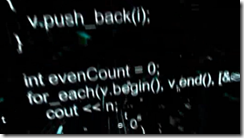 We’re back with the third installment of C9::GoingNative.
We’re back with the third installment of C9::GoingNative.
At the recent //BUILD conference, we introduced a series of technologies targeting the upcoming version of the Windows platform. One of those consists in some extensions to the C++ language, intended to help developers bridge their C++ logic to the Windows Runtime (WinRT) environment.
C++/CX (the name of these extensions) is a lightweight syntax for COM creation, being COM the framework that allows components written in different languages to interoperate in Windows. In practice, it allows the user interface to be designed with ad hoc tools like MS Expression (XAML) or any HTML5 editor, while adding application behavior in C++.
The reception of C++/CX is mixed so far. It’s being appreciated for those developers who considered COM a complex technology despite its usefulness. It’s not much liked by developers who dealt with COM or the Active Template Library (ATL), an abstraction layer to make COM creation easier.
These last ones asked about an approach that doesn’t involve non-standard language extensions but an API that encapsulated COM complexities. Such API is called Windows Runtime Library (WRL) and follows the principles of ATL, re-implementing those for the Windows Runtime though.
In this episode, we interviewed Sridhar Madhugiri, one of the authors of the WRL, who answered for us questions like When would you use WRL? Why would you use WRL? How do you use WRL?
Prior to that Tarek Madkour, a leader on the VC++ team, shares some wise perspectives on modern C++ for Windows 8 (Metro style apps). Enjoy this episode!!

0 comments